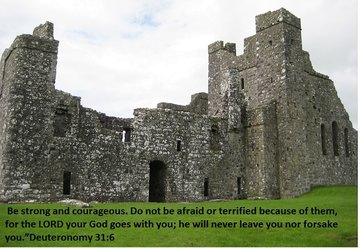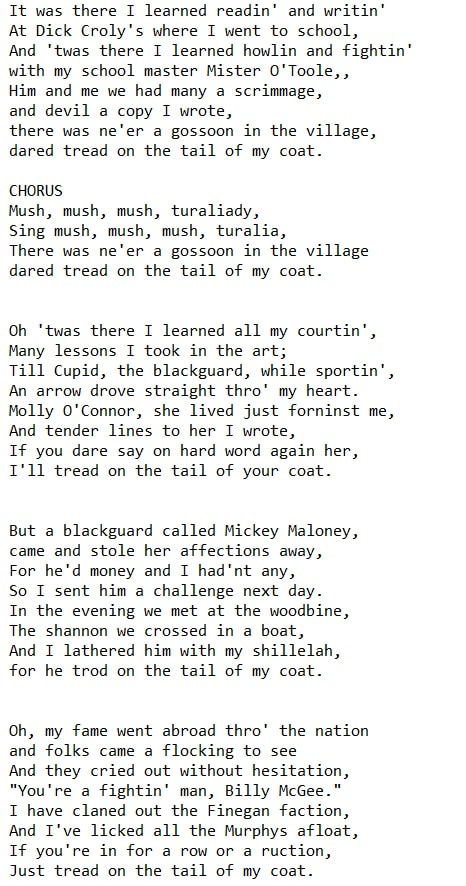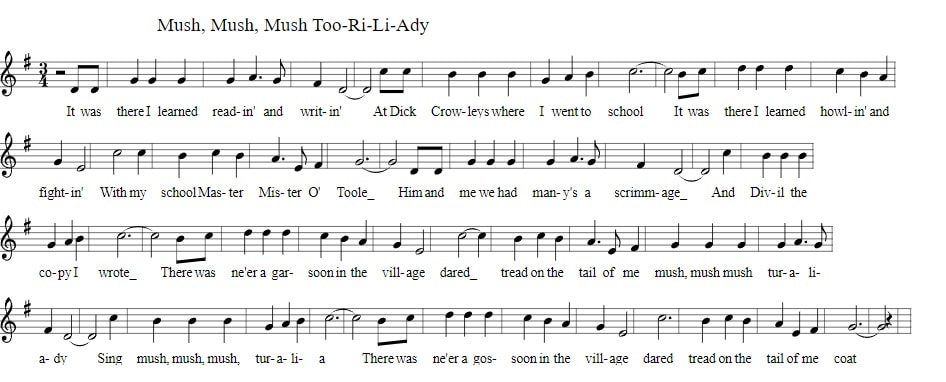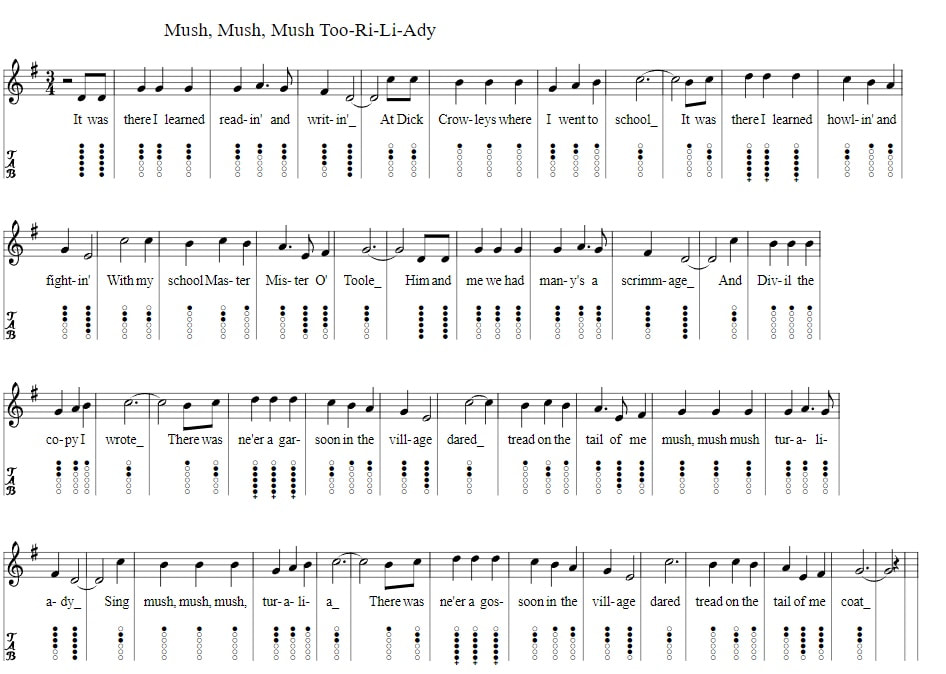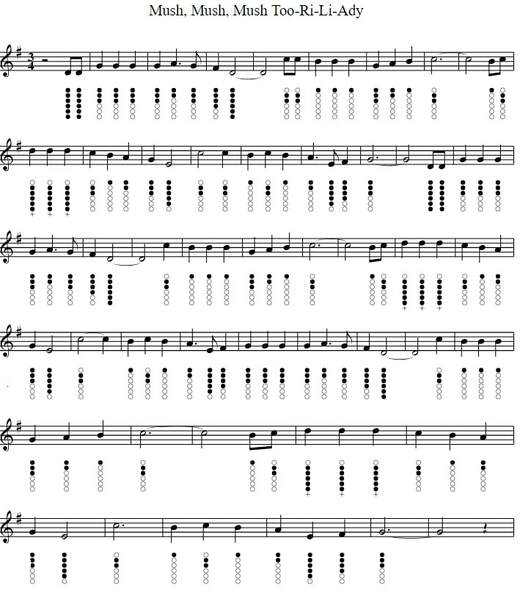Mush Mush Irish song lyrics and guitar chords
Song taken from the John Ford film ''The Quiet Man'' staring John Wayne, Maureen O'Hara and Barry Fitzgerald who sings this song.The easy guitar chords in G Major are in chordpro. The song writer remains unknown, recorded by The Clancy Brothers And Tommy Makem. I'm sure there was a verse at the start of this song that went missing over the years, I have yet to find it. The famous song from that movie is The Isle Of Innisfree Song. Recorded by Michael O'Duffy. The sheet music and tin whistle notes are included.
Song Words - Easy Guitar Chords In G Major Key
[G]It was there I learned readin' and [D]writin'
At Dick[G] Croly's where I went to[C] school,
And 'twas[G] there I learned [G7]howlin and [C]fightin'
[Am]with my[G] school master[D7] Mister O'[G]Toole,,[D]
Him and[G] me we had many a [D]scrimmage,
and [G]devil a copy I [C]wrote,
there was [G]ne'er a goss[G7]oon in the [C]village,
[Am]dared [G]tread on the [D7]tail of my [G]coat.
CHORUS
Mush, mush, mush, turaliady,
Sing mush, mush, mush, turalia,
There was ne'er a gossoon in the village
dared tread on the tail of my coat.
Oh 'twas there I learned all my courtin',
Many lessons I took in the art;
Till Cupid, the blackguard, while sportin',
An arrow drove straight thro' my heart.
Molly O'Connor, she lived just forninst me,
And tender lines to her I wrote,
If you dare say on hard word again her,
I'll tread on the tail of your coat.
But a blackguard called Mickey Maloney,
came and stole her affections away,
For he'd money and I had'nt any,
So I sent him a challenge next day.
In the evening we met at the woodbine,
The shannon we crossed in a boat,
And I lathered him with my shillelah,
for he trod on the tail of my coat.
Oh, my fame went abroad thro' the nation
and folks came a flocking to see
And they cried out without hesitation,
"You're a fightin' man, Billy McGee."
I have claned out the Finegan faction,
And I've licked all the Murphys afloat,
If you're in for a row or a ruction,
Just tread on the tail of my coat.
[G]It was there I learned readin' and [D]writin'
At Dick[G] Croly's where I went to[C] school,
And 'twas[G] there I learned [G7]howlin and [C]fightin'
[Am]with my[G] school master[D7] Mister O'[G]Toole,,[D]
Him and[G] me we had many a [D]scrimmage,
and [G]devil a copy I [C]wrote,
there was [G]ne'er a goss[G7]oon in the [C]village,
[Am]dared [G]tread on the [D7]tail of my [G]coat.
CHORUS
Mush, mush, mush, turaliady,
Sing mush, mush, mush, turalia,
There was ne'er a gossoon in the village
dared tread on the tail of my coat.
Oh 'twas there I learned all my courtin',
Many lessons I took in the art;
Till Cupid, the blackguard, while sportin',
An arrow drove straight thro' my heart.
Molly O'Connor, she lived just forninst me,
And tender lines to her I wrote,
If you dare say on hard word again her,
I'll tread on the tail of your coat.
But a blackguard called Mickey Maloney,
came and stole her affections away,
For he'd money and I had'nt any,
So I sent him a challenge next day.
In the evening we met at the woodbine,
The shannon we crossed in a boat,
And I lathered him with my shillelah,
for he trod on the tail of my coat.
Oh, my fame went abroad thro' the nation
and folks came a flocking to see
And they cried out without hesitation,
"You're a fightin' man, Billy McGee."
I have claned out the Finegan faction,
And I've licked all the Murphys afloat,
If you're in for a row or a ruction,
Just tread on the tail of my coat.
Here are the guitar chords as played by Barleyjuice
in the youtube video.
[D]It was [G]there I learned readin' and [D]writin'
At Dick[C] Croly's where [D]I went to[G] school,
And 'twas there I learned howlin and [Am]fightin'
[D]with my[G] school master[D7] Mister O'[G]Toole,
Him and[G] me we had many a [D]scrimmage,
and [C]devil a [D]copy I [G]wrote,
[D]there was ne'er a goss[D]oon in the [Am]village,
[Am]dared [G]tread on the [D7]tail of my [G]coat.
CHORUS
[G]Singing Mush, mush, mush, [D]turaliady,
Sing [C]mush, mush, mush, [D]turali[G]a,
There was ne'er a gos[D]soon in the [Am]village
[D]dared [G]tread on the [D]tail of my [G]co
in the youtube video.
[D]It was [G]there I learned readin' and [D]writin'
At Dick[C] Croly's where [D]I went to[G] school,
And 'twas there I learned howlin and [Am]fightin'
[D]with my[G] school master[D7] Mister O'[G]Toole,
Him and[G] me we had many a [D]scrimmage,
and [C]devil a [D]copy I [G]wrote,
[D]there was ne'er a goss[D]oon in the [Am]village,
[Am]dared [G]tread on the [D7]tail of my [G]coat.
CHORUS
[G]Singing Mush, mush, mush, [D]turaliady,
Sing [C]mush, mush, mush, [D]turali[G]a,
There was ne'er a gos[D]soon in the [Am]village
[D]dared [G]tread on the [D]tail of my [G]co
Mush Mush Sheet Music And Tin Whistle Notes In G Major. If you're playing this old folk song on the whistle then you a D whistle, as that's what the sheet music is set up for, regardless of what the key says.
